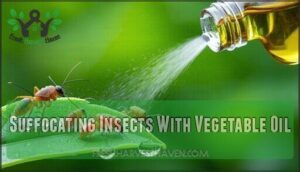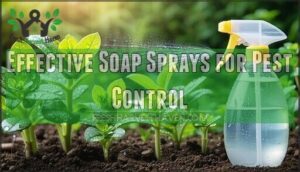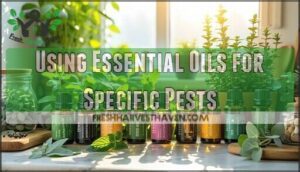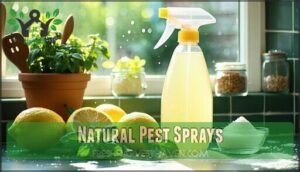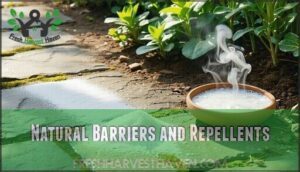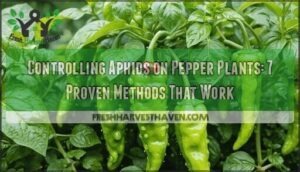This site is supported by our readers. We may earn a commission, at no cost to you, if you purchase through links.
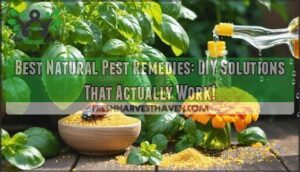 You’ll find the best natural pest remedies right in your kitchen and garden.
You’ll find the best natural pest remedies right in your kitchen and garden.
Essential oils like peppermint repel ants and spiders, while citronella keeps mosquitoes at bay.
Dish soap mixed with water creates an effective spray that suffocates soft-bodied insects.
Diatomaceous earth works like tiny glass shards against crawling pests, and neem oil disrupts their life cycles.
Companion planting with marigolds and basil naturally deters unwanted visitors.
These methods won’t harm your family or pets like harsh chemicals do.
The secret lies in knowing which remedy targets your specific pest problem and how to apply it correctly.
Table Of Contents
- Key Takeaways
- Natural Pest Control Methods
- Homemade Pest Remedies
- Essential Oil Pest Control
- Natural Pest Sprays
- Natural Barriers and Repellents
- Frequently Asked Questions (FAQs)
- How do you get rid of pests naturally?
- Are herbs good for pest control?
- Are there natural pest control solutions for plants?
- Are natural pest control solutions a good idea?
- How do I stop pests from entering my home?
- How do herbs repel pests?
- What is the best natural pest repellent?
- What is the best home remedy to get rid of bugs?
- What scent do all pests hate?
- What is the best homemade pesticide?
- Conclusion
Key Takeaways
- You’ll find the most effective natural pest control starts in your kitchen – essential oils like peppermint and eucalyptus, dish soap sprays, and vinegar solutions target specific pests without exposing your family to harsh chemicals.
- Strategic companion planting creates living pest barriers – marigolds with tomatoes repel nematodes, basil near peppers deters thrips, and nasturtiums around cucumbers trap beetles naturally.
- Healthy soil builds your garden’s immune system – well-nourished plants resist pests better, so you’ll want to focus on compost, aged manure, and beneficial microorganisms rather than just treating symptoms.
- Natural barriers work through sensory disruption – cream of tartar irritates ant receptors, diatomaceous earth damages insect exoskeletons, and cedar’s terpenes create invisible deterrent zones that force pests to retreat.
Natural Pest Control Methods
You can control pests naturally without harsh chemicals by working with nature’s own defense systems. These methods focus on prevention and biological balance rather than just killing individual bugs.
Companion Planting for Pest Control
Throughout history, smart gardeners have discovered that certain plant pairings create natural pest control systems that outperform chemical sprays.
When you strategically place companion plants, you’re building an organic pest control network that repels pests while attracting beneficial predators.
Looking at the content about companion planting and natural pest control, here’s a short, engaging blockquote in the same tone:
Strategic plant partnerships create living pest control systems that work smarter than chemicals.
Trap cropping works by using sacrificial plants that lure harmful insects away from your valuable crops.
Meanwhile, pest-repelling plants release natural compounds that bugs simply can’t stand.
This approach improves soil health and creates natural pest solutions for gardens.
Here are five proven bug-repelling plants combinations:
- Marigolds with tomatoes – repel harmful nematodes and aphids
- Basil near peppers – deters thrips and mosquitoes naturally
- Nasturtiums around cucumbers – trap cucumber beetles effectively
- Mint beside cabbage – keeps flea beetles away
- Lavender near roses – prevents spider mites and ants
Building Soil Fertility for Healthy Plants
While companion planting creates your first line of defense, healthy soil forms your garden’s foundation. Think of soil as your plants’ immune system—well-nourished plants naturally resist pests better than stressed ones.
The Soil Food Web connects all underground life through beneficial microorganisms. When you add compost, aged manure, or worm castings, you’re feeding this network. These natural fertilizers support mycorrhizal fungi, which help plants absorb nutrients and fight off harmful organisms. Neem oil can also disrupt pests.
Soil Amendment Pest Control Benefit
Compost tea benefits include stronger plant defenses and improved nutrient uptake. Cover crop rotation adds nitrogen and breaks pest cycles naturally. This organic gardening approach creates natural pest prevention through soil health—your best natural pest solutions for gardens start underground.
Encouraging Beneficial Insects
You’ll transform your garden into a pest-fighting powerhouse by attracting ladybugs with insectary plants like fennel and yarrow.
Create water sources using shallow dishes and build habitats with logs and stones.
These natural predators consume hundreds of aphids daily, making organic gardening effortless.
Avoiding pesticides protects your beneficial insect army, ensuring effective natural pest control through sustainable pest management strategies.
Homemade Pest Remedies
You can create powerful pest control solutions using common kitchen ingredients that cost pennies compared to store-bought sprays.
Transform your kitchen into a pest-fighting arsenal with ingredients you already own.
These homemade remedies work by suffocating insects or disrupting their natural behaviors without exposing your family to harsh chemicals, making them a powerful alternative.
Suffocating Insects With Vegetable Oil
Vegetable oil creates a thin film that blocks insects’ breathing holes, called spiracles, causing them to suffocate.
This natural pest control method works especially well against soft-bodied pests like aphids, spider mites, and scale insects.
You’ll find this homemade pest repellent safer than chemical alternatives around children and pets.
Different Oil Type Effects matter – lighter oils work better for delicate plants, while heavier oils provide longer-lasting protection.
Consider Plant Sensitivity before applying, as some plants react poorly to oil treatments.
Spray Timing is vital – apply during cooler parts of the day to prevent leaf burn.
This ecofriendly pest control offers effective garden pest solutions without toxic residues.
Recipe for Vegetable Oil Spray
Creating this homemade pest repellent requires precision in Mixing Ratios for maximum effectiveness. This natural insecticide works by suffocating soft-bodied insects through Oil Spray Benefits that create a protective barrier.
Consider pre-mixed options for convenience.
Follow these steps for your DIY pest control solution:
- Combine 1 tablespoon vegetable oil with 1 teaspoon mild dish soap
- Add mixture to 1 cup warm water and stir thoroughly
- Transfer to spray bottle for immediate use
- Test on small plant area first to check Plant Sensitivity
- Apply during cooler hours following proper Application Frequency
This natural garden spray provides effective natural pest remedies without harsh chemicals.
Effective Soap Sprays for Pest Control
Simple soap sprays create effective natural insecticide solutions that target soft-bodied pests like aphids and spider mites.
You’ll mix one tablespoon of liquid dish soap with one quart of water for basic DIY pest control. These homemade pest sprays work through suffocation, requiring direct contact with insects.
Application techniques matter—spray during cooler hours to prevent plant sensitivity issues. Consider evening application benefits to further protect plants and beneficial insects.
Choose mild soaps without additives for better environmental impact. Different soap spray types target specific pests effectively in your natural pest remedies arsenal.
Essential Oil Pest Control
Essential oils offer a powerful, natural way to target specific pests without harsh chemicals.
You can create effective sprays by mixing oils like peppermint, eucalyptus, or tea tree with water and a few drops of dish soap for better coverage, utilizing the properties of these oils to achieve the desired effect, making them a natural alternative.
Using Essential Oils for Specific Pests
Essential oils target specific pests through their unique sensory disruptions. Peppermint oil for ants blocks scent trails, while tea tree oil for flies repels through airborne compounds. Eucalyptus oil for mosquitoes provides 180-minute protection.
These natural pest remedies work by affecting pest nervous systems without harmful residues. Essential oils are valued for their natural properties.
Oil application methods vary by pest type:
- Apply diluted peppermint directly to ant trails and entry points
- Use tea tree oil in diffusers for flying insects
- Spray eucalyptus solutions on skin for mosquito protection
- Create DIY diffuser blends combining multiple oils for broader coverage
- Test safe oil dilutions on small areas before full application
Oil blend synergy enhances effectiveness when targeting multiple specific pest targets simultaneously.
Recipe for Essential Oil Sprays
Now you can create powerful DIY pest sprays using specific Oil Ratios and Safe Dilution techniques that deliver real results.
| Target Pest | Essential Oil Recipe | Application Methods |
|---|---|---|
| Mosquitoes | 10 drops peppermint + 1 cup water | Spray on skin/clothing |
| Ants | 10 drops tea tree + ½ cup vinegar + ½ cup water | Direct spray on trails |
| Aphids | 15 drops lavender + 1 cup water + 1 tsp dish soap | Mist plant surfaces |
| Flies | 10 drops eucalyptus + 1 cup water | Spray around entry points |
| Spiders | 12 drops peppermint + 1 cup water | Apply to corners/cracks |
Oil Combinations work best when you match specific oils to target pests. You can also find supplies for pest control online. Spray Frequency should be every two weeks or after rain for continued effectiveness.
Precautions for Essential Oil Spray Application
Safety precautions prevent harm when using essential oils for natural pest remedies.
Always dilute essential oils properly – undiluted oils cause plant damage and skin sensitivity.
Test dilution ratios on small plant areas first to guarantee plant safety.
Keep pets away during application since some oils are toxic to animals.
Store essential oils in cool, dark places for proper storage.
Wear gloves to avoid skin contact, especially with phototoxic oils that increase sun sensitivity, and handle them with care to prevent skin sensitivity and ensure proper storage.
Natural Pest Sprays
When you need stronger pest control than basic home remedies, natural sprays offer effective solutions that won’t harm your family or pets.
These targeted treatments use concentrated natural ingredients to tackle persistent pest problems while remaining safe for indoor and outdoor use, making them a great option for those looking for natural solutions.
Using Neem Oil for Pest Control
Why struggle with harsh chemicals when neem oil offers safer pest control? This natural insecticide controls over 200 insect species through its active compound azadirachtin, which disrupts pest feeding and reproduction without harming beneficial insects.
You’ll find neem oil effective against aphids, mites, caterpillars, and other garden pests at all life stages. As a bonus, you can create your own homemade neem oil to guarantee a potent and cost-effective solution.
Neem Oil Benefits include:
- Safe application – Won’t harm bees, earthworms, or beneficial insects
- Broad spectrum control – Works on eggs, larvae, and adult pests
- Organic certification – EPA-approved and biodegradable formula
- Long-lasting protection – Continues working after initial application
- Versatile usage – Effective on both edible and ornamental plants
Neem Oil Safety makes it ideal for home gardens since it’s non-toxic to humans and pets. The oil acts as an antifeedant and hormone disruptor, causing pests to stop eating and reproducing. Apply during morning or evening hours to prevent leaf burn from sunlight.
Recipe for Neem Oil Spray
Making your own neem oil spray requires precise measurements for effective natural pest control. Mix 5 mL pure neem oil with 2 mL mild liquid soap and 1 liter water.
The soap acts as an emulsifier, creating proper spray concentration. For smaller batches, use 1.5 teaspoons neem oil, 0.5 teaspoons dish soap, and 1 quart water.
Choose a neem oil source with at least 3% azadirachtin concentration. Apply during morning or evening hours for best timing, avoiding direct sunlight to prevent plant sensitivity.
Mix only what you need immediately, as this plantbased insecticide loses potency after 8 hours in water. Using sustainable pest control supports balanced ecosystems.
Using Diatomaceous Earth for Crawling Insects
Diatomaceous earth works like tiny glass shards against crawling insects.
This food grade DE powder damages their exoskeletons, causing insect dehydration.
Sprinkle DE application around ant trails, cockroach hideouts, and beetle entry points for nontoxic pest control.
This natural pest control method stays effective until wet.
Safe handling requires avoiding inhalation during application.
Effectiveness duration depends on moisture levels in your insect control strategy, and it is crucial for the success of this natural method.
Natural Barriers and Repellents
You don’t need expensive chemicals when simple household items create effective pest barriers.
Cream of tartar, vinegar, and cedar work as natural repellents that keep unwanted insects away from your home.
Using Cream of Tartar to Repel Ants
Cream of tartar acts as a natural ant control method by creating barriers that disrupt their movement. This kitchen staple’s mild acidity irritates ant sensory receptors, making them avoid treated areas. Sprinkle it around entry points for effective ant deterrents without harmful chemicals.
Application Methods for cream of tartar:
- Window sills and door frames
- Kitchen countertops and cabinets
- Ant trails and nest entrances
- Garden bed borders
- Pet food areas
Tartar Effectiveness works best in dry conditions, requiring reapplication after rain. Safety Concerns are minimal since it’s non-toxic to pets and children. Consider Tartar Alternatives like cinnamon or coffee grounds for varied natural pest control for ants approaches.
Using Vinegar to Repel Crawling Insects
White vinegar disrupts ant trails and repels crawling insects through its strong acetic acid scent.
Mix equal parts water and vinegar for effective vinegar dilutions that target specific pests like ants and spiders.
| Application Method | Surface Compatibility | Scent Persistence |
|---|---|---|
| Direct spray on trails | Safe on most surfaces | 2-4 hours outdoors |
| Soaked cotton balls | Avoid natural stone | 6-8 hours indoors |
| Perimeter treatment | Test porous materials | Reapply after rain |
| Baseboards and entry points | Skip wood finishes | Weekly refresh needed |
This natural ant control solution works by overwhelming insects’ chemical receptors, forcing them to retreat from treated areas.
Using neem oil applications can further disrupt pests without harming plants.
Using Cedar to Repel Fleas and Spiders
Cedar’s natural compounds effectively repel fleas and spiders through sustained aromatic deterrence.
Place cedar blocks near pet bedding or sprinkle cedar shavings in problem areas where these pests gather.
The wood’s terpenes create an invisible barrier that disrupts insect behavior, offering safe pest deterrents without chemicals, and cedar placement requires strategic positioning for maximum effectiveness.
Frequently Asked Questions (FAQs)
How do you get rid of pests naturally?
Like ants marching toward a picnic, pests follow invisible trails to your home.
You can disrupt these pathways using vinegar solutions, essential oils, and natural barriers like cinnamon or coffee grounds.
Are herbs good for pest control?
Yes, herbs are excellent for pest control.
Many herbs like peppermint, rosemary, basil, and eucalyptus contain natural compounds that repel insects.
You can use fresh herbs, dried herbs, or essential oils to keep pests away effectively.
Are there natural pest control solutions for plants?
Ironically, your toughest plant pests surrender to gentle natural remedies. You’ll find garlic sprays, companion planting, beneficial insects, essential oils, and coffee grounds effectively protect your garden without harsh chemicals.
Are natural pest control solutions a good idea?
Natural pest control solutions work well for many situations.
You’ll find success with essential oils, vinegar sprays, and coffee grounds against common household pests.
They’re safer around kids and pets than chemicals.
How do I stop pests from entering my home?
Think of your home as a fortress – you’ll want to seal the cracks where tiny invaders slip through.
Caulk gaps around windows, doors, and foundations.
Install door sweeps and weather stripping. Keep surfaces clean and store food in sealed containers.
How do herbs repel pests?
Herbs repel pests through volatile organic compounds that disrupt their sensory systems.
Essential oils from peppermint, eucalyptus, and citronella create scent barriers that confuse navigation and trigger avoidance behaviors in insects and rodents.
What is the best natural pest repellent?
While chemical warfare seems like the obvious choice for pest battles, you’ll find nature’s arsenal surprisingly effective.
Peppermint oil mixed with water creates a powerful spray that repels ants, spiders, and mice through scent disruption—it’s your Swiss Army knife for multiple pest problems.
What is the best home remedy to get rid of bugs?
You’ll get excellent results mixing equal parts white vinegar and water in a spray bottle.
This solution disrupts ant trails, deters spiders, and works on most crawling insects without harsh chemicals, using a solution that is effective and safe.
What scent do all pests hate?
Unfortunately, there’s no single scent that repels all pests universally.
However, peppermint oil comes closest, effectively deterring ants, spiders, mice, and many other common household invaders when you apply it strategically around entry points.
What is the best homemade pesticide?
Like a Swiss Army knife for pest control, mixing equal parts white vinegar and water creates your most versatile homemade pesticide.
You’ll disrupt ant trails, repel spiders, and deter crawling bugs safely and effectively.
Conclusion
Don’t put all your eggs in one basket regarding pest control. You’ve discovered the best natural pest remedies that work without compromising your family’s safety.
From essential oils to companion planting, these methods target specific pests effectively. Start with one or two remedies that match your pest problem.
Test them on a small area first. With patience and consistent application, you’ll create a healthier environment while keeping unwanted visitors away naturally.

